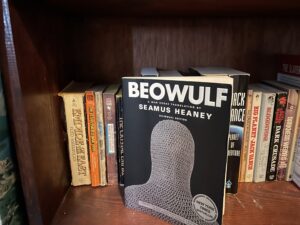
I have read Beowulf a couple of times, but it has been some years since my last visit to Heorot. I picked up a copy of Seamus Heaney’s translation a week or so ago and plunged right back into the feasting and carnage and recounting of raids, counter raids, and giving of gifts. It remains glorious.
Beowulf belongs to that tradition of supermen, strong beyond mortal capacity, capable of incredible feats of endurance. I mean, the man can hold his breath for most of a day and swim for a week. He is in good company, joining the ranks of Gilgamesh, Samson, Hercules, and Cu Cuhlainn, to name just a few. Later entries include Paul Bunyan and Pecos Bill. From that American branch derive such offshoots as Popeye and, yes, Superman. Also, happily, genre variations like Breckenridge Elkins. And Conan, the great grand daddy of sword-and-sorcery strongmen, whose progeny are still flourishing today.
People have always craved tales of extraordinary men, superlative heroes. Demigods who retain our mortal proclivities and weaknesses, who might still succumb to the dragon’s fire, fighting one last time at an advanced age.
Raise your mead horn to Beowulf.
And why not raise a beer mug to Brick, the strongman protagonist of Thick As Thieves. What, you haven’t read that one? That can easily be remedied.

3 comments
Beowulf enchanted me the first time I read it in high school. I now have translations by Kevin Crossley-Holland, Burton Raffel, Tolkien, and of course, Heaney. As you suggest, Paul Bunyan and Pecos Bill are the progeny of Beowulf, Hercules, et al. REH knew classic adventure lit, and heard many a Texan tall tale in his boyhood.
Which is your favorite translation?
I have to go with Heaney.